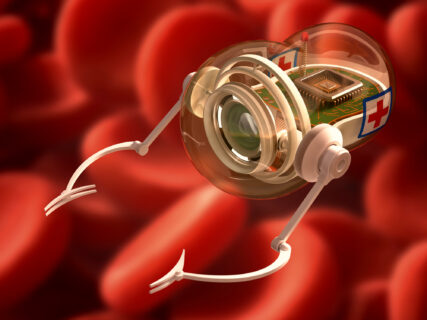Researchers at FAU have received DFG funding to investigate nanoparticles controlled by ultrasound
Nanoparticles are to be used like transporters to deliver medication in a targeted manner exactly where it is required in the human body? All over the world, scientists are working on so-called drug delivery technologies, as is Prof. Dr. Geoffrey Lee, Chair of Pharmaceutics at FAU. The idea is that nanoparticles should react to ultrasound frequencies and release the active ingredients to precisely the right target areas only. The German Research Foundation (DFG) has now granted funding of a total of 600,000 euros for the next three years for this interdisciplinary research project.
Drug delivery technology provides great advantages for patients, especially for cancer patients. If medication is taken orally or injected into a blood vessel, it is distributed across the entire body. In the case of chemotherapy, this can lead to damage in areas of the body that are not affected by the cancer. Releasing medication in target areas of the body would prevent such unpleasant damage. The most suitable carriers for the drugs are extremely small particles in the nanometre range that can penetrate deep into the tissue requiring treatment via tiny blood vessels.
Two areas of research
‘In our project, we use so-called sonosensitive nanoparticles made of polymers that react to ultrasound waves, which are injected into the bloodstream’, says Prof. Dr. Helmut Ermert, former Chair of High Frequency Engineering at Ruhr-University Bochum and visiting professor at the Chair of Sensor Technology at FAU since his retirement. These particles carry the pharmaceutical ingredients that are not yet active in this state. Using bundled ultrasound waves, these particles can release the medication they carry at precisely the location where it is needed, explains Ermert.
The researcher is working with PD Dr. Stefan Rupitsch at the Chair of Sensor Technology at the Faculty of Engineering at FAU and Prof. Dr. Geoffrey Lee, Chair of Pharmaceutical Technology at the Faculty of Sciences at FAU on the interdisciplinary and inter-departmental project. On the one hand, this project involves developing both an ultrasound system that allows the active ingredients to be released only in those areas where it is needed and a sensor system that monitors and maps this release in the body. On the other, the researchers are seeking to produce the nanoparticles that will function both as carriers and also react to ultrasound waves and release the active ingredient. The German Research Foundation (DFG) is providing around 610,000 euros of funding for the project until autumn 2021.
Precursor projects use magnets
The researchers at FAU are complementing other projects that have been running for several years at the Chairs of Sensor Technology and Pharmaceutical Technology in cooperation with the Professorship for Nanomedicine at the Faculty of Medicine under the leadership of Prof. Dr. Christoph Alexiou. In these cases, magnetic nanoparticles, which are injected into a blood vessel near the tumour, are used as carriers for active ingredients. Using a strong magnet outside the body, the transported medication can take effect thanks to the prolonged retention times and concentration of the nanoparticles. However, nanoparticles controlled by ultrasound have an advantage, says Prof. Emert, as focused ultrasound enables regions deeper within the body to be reached and treatment can be limited to smaller areas of tissue.
Further information:
Details about the project called ‘Studies on the development and characterization of sonosensitive organic nanoparticles for an ultrasound controlled, local release of pharmaceutical agents’ can be found on the project website of the German Research Foundation (DFG).
Contact:
Prof. Dr. Geoffrey Lee
Department of Chemistry and Pharmacy
Profess of Pharmaceutics
- Phone number: +49913185-29552
- Email: geoff.lee@fau.de

